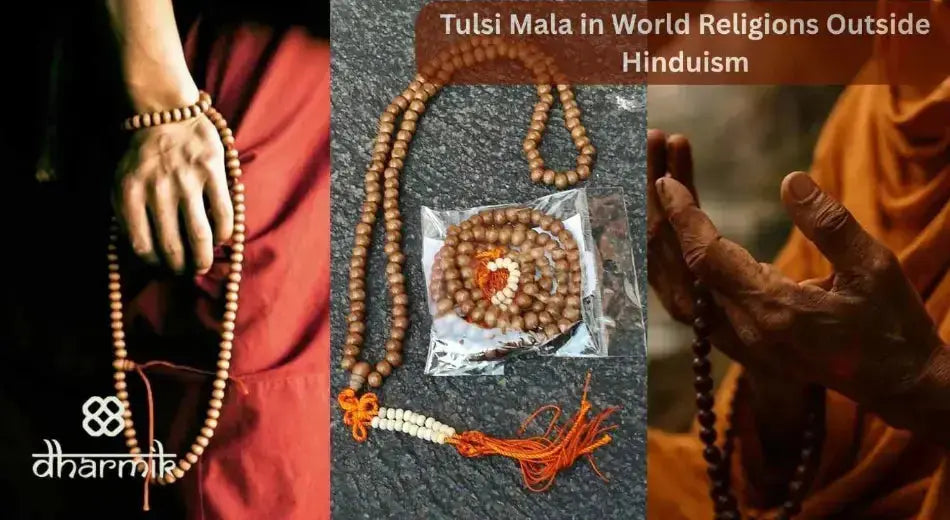
Tulsi Mala in World Religions Outside Hinduism
Share
Tulsi mala, also known as holy basil beads, has long been cherished in Indian spiritual traditions. Within Hinduism, it is revered as sacred and often linked with devotion, purity, and divine blessings. However, what many people do not realize is that Tulsimala is not limited to Hindu traditions alone. Its significance extends beyond Hinduism into other world religions, where it is valued for its spiritual, medicinal, and symbolic qualities.
By exploring the wider acceptance of Tulsi mala, we uncover its remarkable role across various cultures and faiths.

The Universal Appeal of Tulsi Mala
The Tulsi mala is traditionally used as a tool for chanting, prayer, and meditation. Beyond its religious associations, the Tulsi mala has a universal appeal due to its healing properties and the sense of calm it provides during spiritual practices. In different world religions, beads made from natural elements often hold profound significance. The tulsi mala naturally holds significance among these beads, providing believers with a connection to purity, mindfulness, and discipline.
Key reasons for its universal appeal:
-
It is lightweight and simple to use during meditation or prayer.
-
Symbol of purity and spiritual focus.
- The Tulsi plant is associated with health benefits because of its medicinal qualities.
Tulsi Mala in Buddhism
While Buddhism has its own tradition of prayer beads known as "japa malas" or "Buddhist malas," the Tulsi mala is also used by practitioners, particularly in areas where Tulsi grows abundantly. For Buddhists, malas are not just ornaments—they are spiritual tools to count mantras and keep the mind steady during meditation.
-
The natural quality of the Tulsi mala resonates with Buddhist teachings about simplicity and detachment from materialism.
-
Some Buddhist practitioners consider Tulsi beads symbolic of compassion and purity of thought.
-
Meditation with a Tulsi mala is believed to calm the mind, deepen focus, and encourage mindfulness.
Thus, the Tulsi mala integrates smoothly into Buddhist practices while preserving its distinct identity.

Tulsi Mala in Christianity
Prayer beads are also found in Christian traditions, especially as rosaries. While traditional rosaries are typically made from wood, glass, or precious stones, some Christians in certain regions have embraced the Tulsi mala as an alternative because of its natural availability and symbolic significance.
- The Tulsi mala is sometimes used as a substitute for a rosary during personal prayer.
- Its fragrance and connection to purity align with Christian values of devotion and humility.
- In some monastic communities, the Tulsi mala has been adopted for quiet prayer and meditation.
Although it is not as widespread as the rosary, the presence of the Tulsi mala in Christianity demonstrates its cross-cultural adaptability.
Tulsi Mala in Islam
In Islamic tradition, prayer beads called “Misbaha” or “Tasbih” are used to recite the names of Allah. While prayer beads are typically made of wood, glass, or seeds, some communities have incorporated the Tulsi mala due to its natural qualities.
-
The Tulsi mala is valued for its simplicity, organic nature, and ability to enhance focus during zikr (remembrance of God).
-
The natural beads are considered suitable for spiritual use, as they avoid unnecessary ornamentation.
-
For some, a Tulsi mala adds a sense of purity and earthiness to the act of prayer.
While the Tulsi mala is not widely accepted in Islam, its use by certain individuals underscores its subtle role in various world religions beyond Hinduism.
Tulsi Mala in Sikhism
Sikhism also recognizes the use of prayer beads, particularly in personal meditation on God’s name. Some Sikhs have adopted the Tulsi mala for individual practice, despite it not being a central ritual.
-
Tulsi mala serves as a simple reminder of God’s presence in everyday life.
-
It is used by some practitioners to assist in repeating the name of Waheguru.
- Its symbolism of purity resonates with Sikh values of devotion and simplicity.
-
Embrace divine energy with the Tulsi Japa Mala, handcrafted from Tulsi beads. Each bead carries spiritual purity, offering protection, peace, and devotion in your daily life.
Thus, the Tulsi mala, while not officially recognized in Sikh rituals, is embraced by individuals within their personal spiritual practices.
Mala Significance Across Faiths
To understand why the Tulsi mala is valued outside of Hinduism, it is helpful to consider the broader significance of malas in various world religions. Beads serve as a tactile tool to guide the mind, keep track of prayers, and focus thoughts during meditation. T This shared practice across faiths makes the Tulsi mala a natural fit in many traditions.
Common themes of mala significance across religions include:
-
Focus and discipline in spiritual practices.
-
A reminder of divine presence.
-
A connection to natural and sacred elements.
-
A symbol of purity and humility.
The widespread acceptance of Tulsi mala across world religions shows how spirituality often transcends cultural boundaries.
Why Tulsi Mala Stands Out
W What distinguishes Tulsi mala from other beads used in various traditions is its profound connection to nature and healing. Tulsi leaves and stems are recognized in Ayurveda for their medicinal qualities, and the beads made from them carry that association. This connection adds an extra layer of meaning for anyone who uses a Tulsi mala, regardless of their religious background.
-
Tulsi mala is considered both spiritual and therapeutic.
-
It symbolizes a holistic connection between body, mind, and spirit.
-
It represents the merging of devotion and natural healing.
This unique combination ensures that Tulsi mala continues to have universal relevance.
Practical Uses of Tulsi Mala in Daily Life
A The Tulsi mala transcends different faiths and cultures, as it is not restricted to a single ritual. Many people wear it as a symbol of faith, health, and protection.
-
It serves as a It serves as a prayer tool for counting mantras, rosaries, or zikr.
-
It serves as a meditation aid by bringing focus and calm during mindfulness practices.
-
As a protective charm: Believed to ward off negative energy.
-
As a health aid: Associated with stress relief and emotional balance.
Its versatility ensures that Tulsi mala has a role to play in diverse religious and cultural settings.

FAQs on Tulsi Mala in World Religions
Q1. Is Tulsi mala only for Hindus?
Yes, Tulsi mala is used across various traditions. While it is sacred in Hinduism, many practitioners of Buddhism, Christianity, Islam, and Sikhism have also adopted Tulsi mala for prayer and meditation.
Q2. What makes Tulsi mala special compared to other beads?
A Tulsi mala is a natural, lightweight bead that is associated with spiritual purity and medicinal benefits, which makes it unique among prayer beads.
Q3. Can Christians or Muslims use Tulsi mala for prayer?
In some regions, Christians use Tulsi Mala as rosaries, and some Muslims use it for zikr. Its simplicity makes Tulsi mala adaptable across different faiths.
Q4. Does Tulsi mala have health benefits?
Yes, Tulsi is recognized in Ayurveda for its ability to reduce stress and enhance focus. Many people believe that wearing or using a Tulsi mala brings emotional balance.
Q5. How does Tulsi mala connect to mala significance in general?
Like other malas, Tulsi mala aids in prayer, meditation, and enhancing spiritual focus. It also carries added value because of Tulsi’s sacred and healing reputation.
Final Reflection: Tulsi Mala as a Global Symbol
The journey of the Tulsi mala beyond Hinduism reveals a fascinating truth: spirituality transcends all boundaries. F From Buddhist monks to Christian devotees, and from Muslim zikr practitioners to Sikh meditators, the Tulsi mala has quietly become a part of the prayer lives of individuals across various regions of the world.
Its universal acceptance stems from a shared understanding of the significance of mala as a tool for devotion, focus, and mindfulness. In the broader context of world religions, the Tulsi mala symbolizes the unity of human aspirations for peace, purity, and divine connection.
In today’s world, where differences often overshadow commonalities, the Tulsi mala serves as a simple yet powerful reminder that faith, in its many forms, consistently seeks the same light.
👉 Order your Tulsi Mala with 108 Original Big Beads for Meditation Here:





